- Home
- V. S. Naipaul
Half a Life Page 7
Half a Life Read online
Page 7
On Monday he went to Debenhams. The girls at the perfume counter took fright at him, and he took fright at them, powdered, unreal, with strange lashes, and looking plucked and shaved like shop chickens. But he eventually found June. In this setting of glass and glitter and artificial light—an extraordinary London, such as he had looked for in the streets when he had just arrived—she was tall and soft and coarse and quite luscious. He could scarcely bear to consider all that had stirred him on Saturday. Below black-line eyebrows and mother-of-pearl eyelids her long eyelashes swept upwards. She greeted him without surprise. He was relieved, and even before he had spoken half a dozen words he saw that she understood his need and was going to be gentle with him. Even then, he found he didn't know how to press the matter, what words to use. All he could say was, “Would you like to see me, June?”
She said, very simply, “Of course, Willie.”
“Can we meet today? When you finish work.”
“Where should we meet?”
“The club.”
“Percy's old place? You have to be a member, you know.”
In the afternoon he went to the club, to see whether he could join. There was no trouble. Again, puzzlingly, there was no one there, apart from the very white woman on the stool and the black barman. The barman (who was perhaps in these quiet periods doing the job Percy did in the old days, being smooth with the smooth and rough with the rough) made Willie fill in a form. Willie then paid five pounds (he was living on seven pounds a week), and the barman—making little circles with his pen before he began to write, like a weight-lifter making feints at a mighty weight on the floor before he actually lifted—took a little time to write out Willie's name on a small membership card.
He watched the street for many minutes before the appointed time, not wishing to be at the club first and then perhaps to be disappointed, and while he watched he played with pictures of June at the end of her working day getting ready somewhere and making her way from Debenhams to the club. He greeted her in the doorway when she came and they went inside, into the dark bar. The barman knew her, and the woman on the stool knew her, and Willie was pleased to be there with someone known. He bought drinks, expensive, fifteen shillings for the two, and all the while in the dark room he was smelling June's perfume and pressing against her and not paying attention to what he was saying.
She said, “We can't go to the college. Percy wouldn't like it, and I can go there only on weekends.” A little later she said, “All right. We'll go to the other place. We'll have to take a taxi.”
The driver made a face when she gave the address. The taxi took them away from the enchanted area of Marble Arch and Bayswater. It then turned north and very soon they were in wretched streets: big unkempt houses, without rails or fences, dustbins outside front windows. They stopped outside one such house. With the tip the fare was five shillings.
At the top of a railless flight of steps, a big, beaten-up door, with layers of old paint showing through in many places, led to a wide, dark hall smelling of old dirt, still with gas brackets on the walls. The wallpaper was almost black at the top; the linoleum on the floor ground down to no colour, though with pieces of the original pattern still at the edges. The stairs at the end of the hall were wide—old style there—but the wooden banisters were rough with grime. The landing window was unwashed and cracked, and the ground at the back was full of rubbish.
June said, “It isn't the Ritz, but the natives are friendly.”
Willie wasn't so sure. Most of the doors were closed. But here and there, as they climbed—the steps narrowing—doors half opened and Willie saw the scowling, lined, yellow faces of very old women. So close to Marble Arch, but it was like another city, as though another sun shone on the college, as though another earth lay below the perfume counter at Debenhams.
The room June opened was small, with a mattress resting on newspapers on the bare floorboards. There was a chair and a towel and a naked hanging light bulb and not much else. June undressed methodically. It was too much for Willie. He hardly enjoyed the moment. In no time at all it was over for him, after a whole weekend of planning, after all the expense, and he didn't know what to say.
June, letting his head rest on her plump arm, said, “A friend of mine says it happens with Indians. It's because of the arranged marriages. They don't feel they have to try hard. My father said his father used to tell him, ‘Satisfy the woman first. Then think of yourself.' I don't suppose you had anybody telling you anything like that.”
Willie thought of his father with compassion for the first time.
He said, “Let me try again, June.”
He tried again. It lasted longer, but June didn't say anything. And then, as before, the moment was over. The toilet was at the end of the black corridor. Spiderwebs, furry with dust, covered the high, rusting cistern, and hung like a kind of material on the small window at the top. June, when she came back, dressed very carefully. Willie didn't watch her. They walked down the steps without talking. A door opened and an old woman looked hard at them. An hour ago Willie would have minded; he didn't mind now. On a landing they saw a small black man with a broad-brimmed Jamaican hat that shadowed his face. His trousers, half of a zoot-suit, tight at the ankles and ballooning all down his legs, were in a thin material meant for a warmer place. He looked at them for longer than he should. They walked down the poor streets, which were very quiet, with big windows blank with sagging curtains and makeshift blinds, to where there was the light of shops and reasonable traffic, London again. No taxi for them now. A bus for June—she talked of going to Marble Arch to get a bus to a place called Cricklewood. Another bus for Willie. Going back to the college, thinking of June going home, to some place he couldn't imagine, thinking of Percy, he felt the beginning of remorse. It didn't last. He kicked it aside. He found he was pleased with himself, after all. He had done a good, an immense, afternoon's work. He was a changed man. He would worry about the money side later.
When he next saw Percy he asked, “What's June's family like?”
“I don't know. I've never seen them. I don't think she likes them.”
Later he went to the college library and looked at a Pelican paperback, The Physiology of Sex. He had seen it around, but had been put off by the scientific title. The little wartime paperback was so tightly bound, with rusting metal staples, that it was hard sometimes to see the beginning of lines. He had to pull at the pages and hold the book at different angles. He came at last to what he was looking for. He read that the average man could keep going for ten to fifteen minutes. That was bad news. A line or two later it became much worse. He read that a “sexual athlete” could easily keep going for half an hour. The frivolous, gloating language—not something he expected in a serious Pelican book—was like a blow. He rejected what he had read, and read no more.
When he next saw Percy he asked, “How did you learn about sex, Percy?”
Percy said, “You have to start small. We all started small. Practising on the little girls. Don't look so shocked, little Willie. I am sure you don't know everything that was happening in your extended family. Your trouble, Willie, is that you are too neat. People look at you and don't see you.”
“You are neater than me. Always in a suit and a nice shirt.”
“I make women nervous. They are frightened of me. That's the way for you, Willie. Sex is a brutal business. You have to be brutal.”
“Is June frightened of you?”
“She is scared stiff of me. Ask her.”
Willie thought he should tell Percy about what had happened. But he didn't know what words to use. Something from an old movie came to him, and he was on the point of saying, “June and I are in love, Percy.” But he didn't like the words, and they refused to come out.
Just a week or so later he was glad he hadn't said anything. Percy—the man about town—took him to a party in Notting Hill one Saturday evening. Willie knew nobody there and he stuck to Percy. June came in after a while. And a little
while after that Percy said to Willie, “This party is dull like hell. June and I are going back to the college to fuck.”
Willie looked at June and said, “Is that true?”
She said in her simple way, “Yes, Willie.”
If anybody had asked him, Willie would have said that Percy was teaching him about English life. In fact, through Percy, and without knowing what he was being introduced to, Willie was becoming part of the special, passing bohemian-immigrant life of London of the late 1950s. This hardly touched the traditional bohemian world of Soho. It was a little world on its own. The immigrants, from the Caribbean, and then the white colonies of Africa, and then Asia, had just arrived. They were still new and exotic; and there were English people—both high and low, with a taste for social adventure, a wish from time to time to break out of England, and people with colonial connections who wished in London to invert the social code of the colonies—who were ready to seek out the more stylish and approachable of the new arrivals. They met in Notting Hill, neutral territory, in dimly lit furnished flats in certain socially mixed squares (not far from where Willie and June had gone that evening); and they were gay and bright together. But few of the immigrants had proper jobs, or secure houses to go back to. Some of them were truly on the brink, and that gave an edge to the gaiety.
There was one man who frightened Willie. He was small and slender and handsome. He was white, or looked white. He said he came from the colonies and he had a kind of accent. From a distance he looked impeccable; close to, he was less impressive, the shirt dirty at the collar, the jacket worn, his skin oily, his teeth black and bad, his breath high. The first time he met Willie he told him his story. He came of a good colonial family, and had been sent by his father to London before the war, to be educated and to be groomed for English society. He had an English tutor. The tutor asked him one day, as part of his training, “If you were going out to dinner and had the choice, would you go to the Ritz or the Berkeley?” The young man from the colonies said, “The Ritz.” The tutor shook his head and said, “Wrong. But a common error. The food at the Berkeley is better. Never forget it.” After the war there was a family quarrel and all that life ended. He had written or was writing about it, and he wanted to read a part of a chapter to Willie. Willie went to his room, in a boarding house not far away. He listened to an account of a visit to a psychiatrist. Very little of what was said by the psychiatrist was in the chapter. There was a lot about the view through the window, and about the antics of a cat on a fence. As Willie listened he felt that the psychiatrist's room was like the room where they were. And when at the end the writer asked Willie for his opinion Willie said, “I wanted to know more about the patient and more about the doctor.” The writer went wild. His black eyes flashed, he showed his small tobacco-blackened teeth, and he shouted at Willie, “I don't know who you are or where you come from or what talent you think you have. But a very famous person has said that I have added a new dimension to writing.” Willie ran out of the room, the man raging at him. But when they met again the man was easy. He said, “Forgive me, old boy. It's that room. I hate it. I feel it's a coffin. Not what I was used to in the old days. I am moving. Please forgive me. Please come and help me move. To show that you bear me no malice.” Willie went to the boarding house and knocked on the writer's door. A middle-aged woman came from a side door and said, “So it's you. When he left yesterday he said he was sending somebody for his luggage. You can take his suitcase. But you must pay my back rent. I'll show you the book. Twenty weeks owing. It comes to sixty-six pounds and fifteen shillings.” Willie ran away again. Now when he went to Percy's parties he looked for the little man with the beard. It wasn't long before he saw him, and the man came up to him, sipping white wine from a wine glass, and said, his breath smelling of garlic and sausage, “Sorry, old boy. But in South Africa we always said that you Indians were loaded, and I thought you would want to help.”
There appeared one evening a man unlike the usual bohemian partygoer. He brought a bottle of champagne for the party, and he presented it to Percy at the door. He was in his fifties, small and carefully dressed in a grey suit with a check pattern, dressed almost to Percy's standards, with the lapels of the jacket handstitched, and the material falling soft over the arm. Percy introduced the stranger to Willie and left the two of them together.
Willie, not a drinking man, but knowing now what was expected of him, said, “Champagne.”
The stranger said, in an extraordinarily soft voice, and an accent that was not the accent of a professional man, “It's chilled. It's from the Ritz. They always keep a bottle ready for me.”
Willie wasn't sure that the man was serious. But the man's eyes were cold and still, and Willie thought that it wasn't necessary for him to decide on the matter. But the Ritz again! How it seemed to matter to them. And to Willie—for whom at home a hotel was the cheapest kind of cheap tea-shop or eating place—it was a strange London idea of luxury: not the drink, not the treat, but the grand hotel, as though the extra price added an extra blessing.
The stranger wasn't going to make conversation with Willie, and Willie saw that he had to do some work.
He said, “Do you work in London?”
The stranger said, “I work right here. I'm a developer. I'm developing this area. It's a rubbish dump now. It will be different in twenty years. I'm willing to wait. There are all these protected old tenants, and they are paying nothing for their accommodation in these big houses, and they're almost in the centre of London. And they really want to live outside. In the leafy suburbs, or in a nice little country cottage. I help them do that. I buy the properties and offer the tenants other accommodation. Some take it. Some don't. Then I break up the place around them. In the old days I would get Percy to send in his darkeys.” He spoke gently, without malice, purely descriptively, and Willie believed him.
Willie said, “Percy.”
“Old London landlord. You didn't know? He didn't tell you.”
Percy said later that evening to Willie, “So the old man cornered you.”
“He said you were a landlord.”
“I've had to do lots of things, little Willie. They wanted West Indian chaps to drive the buses here. But there was the problem of accommodation. People don't want to rent to black people. I don't have to tell you that. So one or two of the island governments encouraged people like me to buy properties and rent to West Indians. That was how it started. Don't get any fancy ideas. The houses I bought were full of people and cost about fifteen hundred pounds. One cost seventeen hundred and fifty. I used to fit in the boys in the spare rooms. I would go around every Friday evening to collect the rent. You couldn't get better people than the boys from Barbados. They were very grateful. On those Friday evenings, just off the London Transport shift, you would find every man Jack of them washed and clean and kneeling down beside the bed in their little rooms and praying. Bible on one side, open at Leviticus, rent book on the other side, closed over the notes. And the notes showing. The old man heard about me and decided to buy me out. I couldn't deny him. It was his manor. He offered me the job in the club. He promised me a piece of the business. When I asked for the piece he said I was being boring. I took the hint and got the college scholarship. But he wants to be friends with me still, and it is better for me to be friends with him. But it worries me, Willie. He wants me to go back to work for him. It worries me.”
Willie thought, “How strange the city is! When I came to look for Speakers' Corner and saw Krishna Menon walking and thinking out his speech about the Suez invasion, I never knew that the club and Debenhams perfume counter were so close on one side, and Percy's old manor, and the old man's, so close on the other side.”
*
IT WAS AT ONE OF those bohemian parties that Willie met a fattish young man with a beard who said he worked for the BBC. He edited or produced programmes for some of the overseas services. He was new in his job, and though personally modest, was full of the importance of what he did. He
was a bureaucrat at heart, honouring convention, but in tribute to his job he felt he should put on bohemian airs in a place like Notting Hill, and to extend patronage to people like Willie: lifting unlikely people up from the darkness to the glory of the airwaves.
He said to Willie, “You have become more and more interesting to me as the minutes have ticked by.”
Willie had been working hard at his family history.
The producer said, “Over here we don't know much about your kind of Christian community. So old, so early. So isolated from the rest of India, from what you say. It would be fascinating to hear about it. Why don't you do a script about it for us? It would fit nicely into one of our Commonwealth programmes. Five minutes. Six hundred and fifty words. Think of it as a page and a half of a Penguin book. No polemics. Five guineas if we use it.”
No one—leaving aside the scholarship people—had ever offered money to Willie before. And, almost as soon as the idea, and the angle, had been given to him by the producer, the five-minute talk had sketched itself in his mind. The beginnings of the faith in the subcontinent rendered as family stories (he would have to check things up in the encyclopaedia); the feeling of separateness from the rest of India; no true knowledge of the other religions of India; the family's work, in the British time, as social reformers, people of Christian conscience, champions of workers' rights (a story or two about the firebrand relation who wore a red scarf when he addressed public meetings); the writer's education at a mission school, and his discovery there of the tension between the old Christian community and the new Christians, backwards, recent converts, depressed people, full of grievances; a difficult experience for the writer but in the end a rewarding one, leading to an understanding and acceptance not only of the new Christians, but also of the larger Indian world outside the Christian fold, the Indian world from which his ancestors had held aloof.

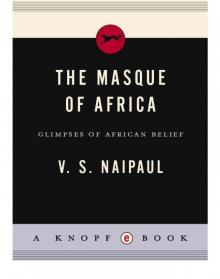 The Masque of Africa: Glimpses of African Belief
The Masque of Africa: Glimpses of African Belief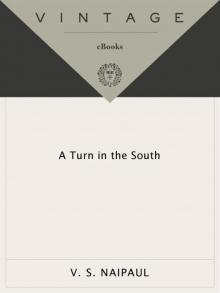 A Turn in the South
A Turn in the South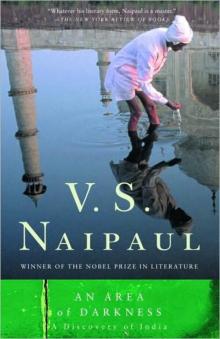 An Area of Darkness
An Area of Darkness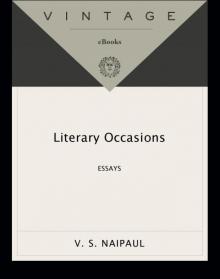 Literary Occasions: Essays
Literary Occasions: Essays A Way in the World
A Way in the World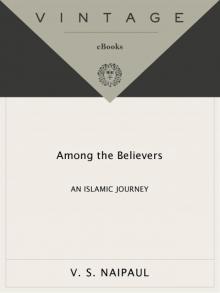 Among the Believers: An Islamic Journey
Among the Believers: An Islamic Journey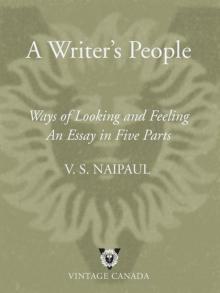 A Writer's People: Ways of Looking and Feeling
A Writer's People: Ways of Looking and Feeling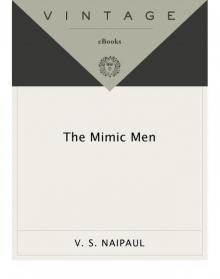 The Mimic Men: A Novel
The Mimic Men: A Novel Collected Short Fiction
Collected Short Fiction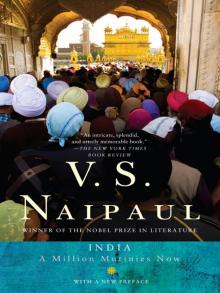 India: A Million Mutinies Now
India: A Million Mutinies Now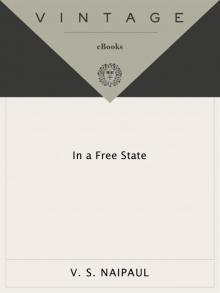 In a Free State
In a Free State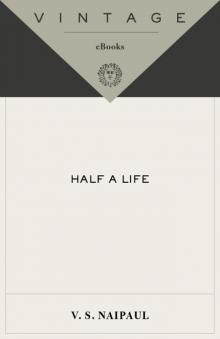 Half a Life
Half a Life Beyond Belief: Islamic Excursions Among the Converted Peoples
Beyond Belief: Islamic Excursions Among the Converted Peoples Guerrillas
Guerrillas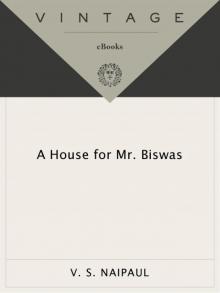 A House for Mr. Biswas
A House for Mr. Biswas The Writer and the World: Essays
The Writer and the World: Essays Magic Seeds
Magic Seeds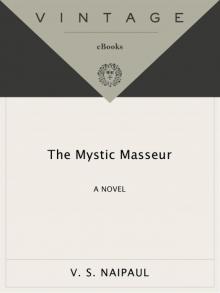 The Mystic Masseur
The Mystic Masseur Miguel Street
Miguel Street The Return of Eva Perón, With the Killings in Trinidad
The Return of Eva Perón, With the Killings in Trinidad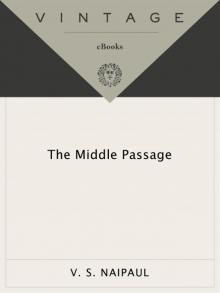 The Middle Passage
The Middle Passage A Bend in the River
A Bend in the River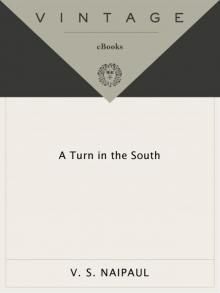 A Turn in the South (Vintage International)
A Turn in the South (Vintage International)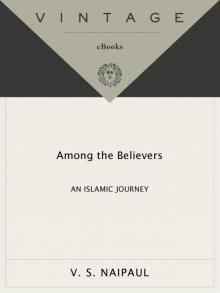 Among the Believers
Among the Believers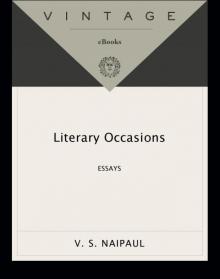 Literary Occasions
Literary Occasions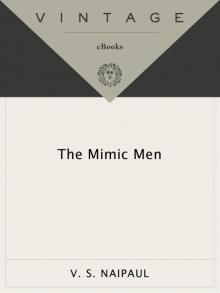 The Mimic Men
The Mimic Men The Writer and the World
The Writer and the World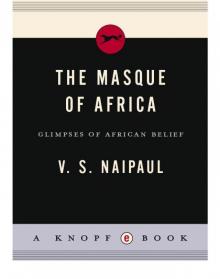 The Masque of Africa
The Masque of Africa